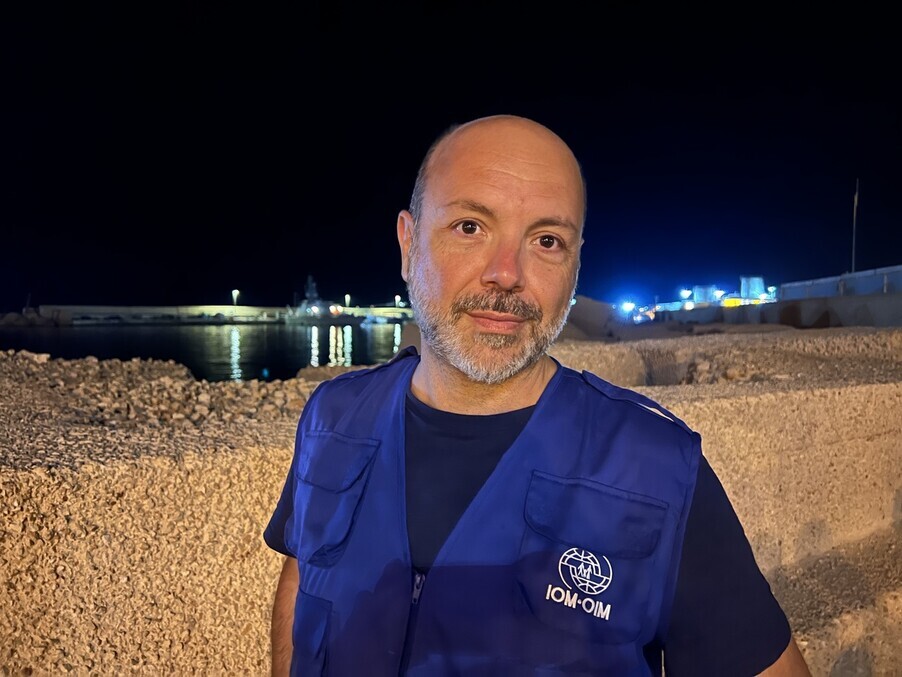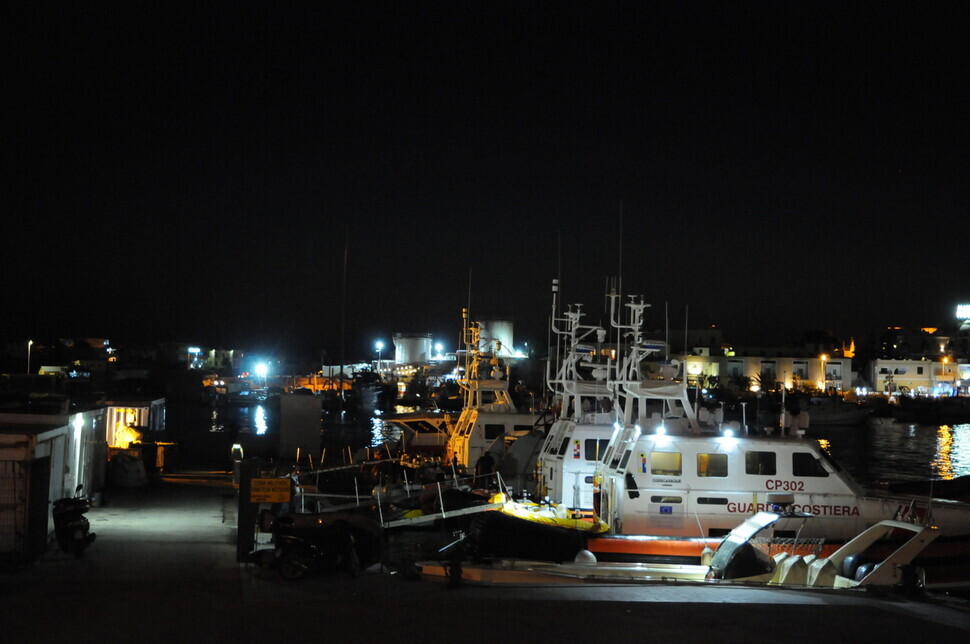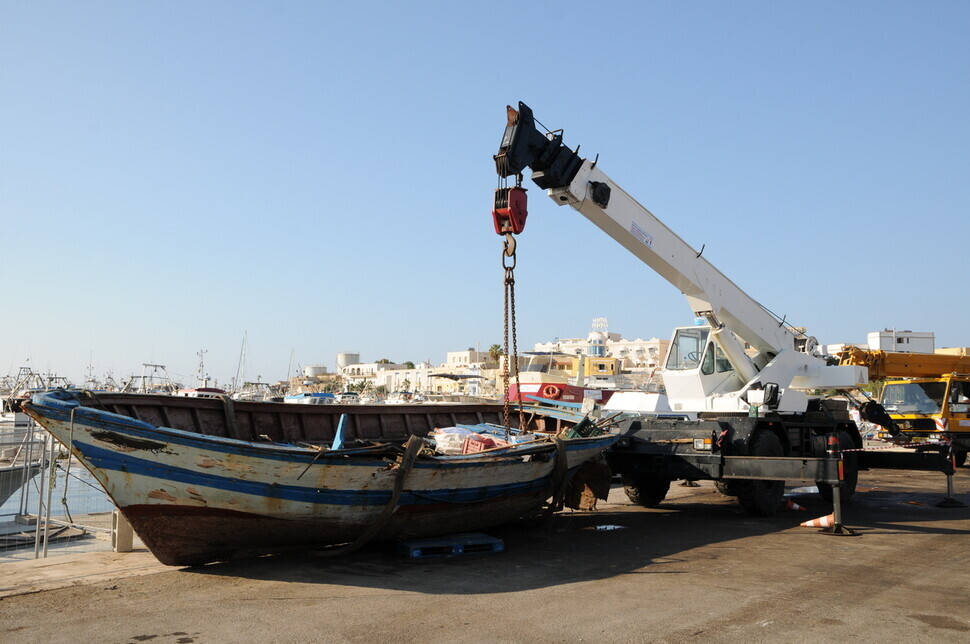hankyoreh
Links to other country sites 다른 나라 사이트 링크
[Interview] Population decline’s impact on economy means Europe needs migrants

Concern is mounting in Italy and throughout southern Europe about a possible second migrant crisis that could echo the predicament of 2015, when more than 1 million migrants arrived in Europe amid the protracted civil war in Syria.
Calling the current circumstances a “humanitarian emergency,” Flavio Di Giacomo, who has worked for the International Organization for Migration since 2007 and currently serves as the spokesperson for the agency’s coordination office for the Mediterranean, says the current political crises in Libya and Tunisia are spurring West Africans who were residing in the region to make dangerous journeys across the ocean to Europe.
The Hankyoreh spoke to Di Giacomo, who has spent the last 17 years watching the flow of African refugees into Europe, about the current situation unfolding on the Italian island of Lampedusa.
Hankyoreh: What’s the situation in Europe right now?Di Giacomo: This year Italy has recorded 130,000 arrivals. Last year, it was half that. This year, 70% arrived here in Lampedusa, while in 2016, it was only 8%.
Hankyoreh: Why Lampedusa? How does the current situation differ from the crisis in 2015?Di Giacomo: The big difference is that in 2016, migrants were leaving from Libya; zero were leaving from Tunisia. This year they are departing from Tunisia. The other difference is that back then migrants were rescued at sea by NGOs, the European rescue system, and they were brought to big ports in Sicily. There is no such rescue system anymore. Lampedusa is very close to Spax. It is a geographical thing; Spax is 10 hours of navigation from Lampedusa. The Tunisian route has never been patrolled by NGOs because it’s a safer route, usually, and it’s shortest. The most dangerous was the Libyan route. But for the first time, the Tunisian route this year is very dangerous.
Hankyoreh: What’s made it more dangerous this time around?Di Giacomo: Migrants from Tunisia are arriving on very small and fragile iron boats that break. So many times, they arrive with water inside the boat. There will be water up to their feet when we arrive, or rescuers arrive, and they’ll find people in the water. These boats are given to migrants who have less money to pay by smugglers. They are provided with very, very bad boats. [The boats usually cost] between US$500 and US$700. But I’ve read from colleagues in Tunisia it can go as low as US$300.
We think we’ve calculated 2,093 missing this year. But we really think that there are many, many more deaths, because there are a lot of shipwrecks. Nobody knows anything about the so-called “ghost shipwrecks.” Sometimes the Italian coast guard finds bodies at sea. Nobody knows. We say 2,000 but could also be 3,000 or 4,000.

Di Giacomo: So for the first time from Tunisia, there are also Tunisians, but the main nationalities are Ivory Coast and elsewhere — people who had gone to Tunisia to live. They are leaving Tunisia because of the situation: the geopolitical and political crisis of the country and racial discrimination. These migrants are victims. They didn't want to come to Italy from the get-go, you know, they are just fleeing racial discrimination and violence in Tunisia. This is the real problem. The reasons behind the decision to leave. They don't want to leave; they go because they cannot live there anymore safely.
Hankyoreh: Would you say this is like a repeat of the crisis in 2015-2016 where there was an influx of Syrian refugees?Di Giacomo: This is not an emergency in terms of numbers. This is an emergency for this island and is a humanitarian emergency, so we have to find alternatives.
Hankyoreh: What solutions are there?Di Giacomo: The solution in this case would be, first of all, opening up a regular entry channel. We need alternatives so they don’t have to pay smugglers and take such risks. So the solution is to open regular channels to migration. We also need to rescue migrants before arriving at Lampedusa and bring them to Sicily, as well as promote respect for human rights in the countries of departure, because if migrants are leaving from Tunisia, it is not because they want to leave from Tunisia, but because they cannot live safely in Tunisia. Closing the routes when people were detained in terrible detention centers in inhumane conditions and women are becoming victims of sexual violence — we cannot pretend it’s not happening.
These are people who just want to be helped. The narrative is totally wrong. Europe needs migrants because there is a demographic crisis. In the next 25 years, at least 47% of people will be in retirement. So with that, there will be a huge economic crisis because of the demography. Europe should stop advocating for closing borders and instead open regular entry channels and look at the next 15 to 20 years, not at the next three months.
Hankyoreh: The European Union recently made an agreement with the Tunisian government to give it money as a deterrent for migration. What are your thoughts on that?Di Giacomo: This hasn’t worked so far, because arrivals are on the rise. Europe did the same thing with Türkiye. And the same thing for Libya. And at the end of the day, sure, you’ll have fewer arrivals for a few months or a couple of years. But then people have to leave because they've risked their lives, not only in their countries of origin in the case of refugees, but also, they start their journey as economic migrants and arrive in Libya. And they're victims of human rights violation abuses, violence, torture, kidnapping — they leave because they want to save their lives.
In 20 years, we’ve counted 22,300 dead in the central Mediterranean. That is the failure of everybody, even us, but mainly politicians.

Di Giacomo: Italy says it wants to repatriate people, but it will not happen except for a few countries — some Tunisians, some Egyptians, et cetera. So small numbers. Because Italy doesn't have a bilateral agreement to repatriate people. In order to repatriate someone who doesn't have a passport, you need the cooperation of the embassies of the countries of origin. The countries of origin do not cooperate, for political reasons. Because it's not good that you have to accept your own citizens who have left their country in search of a better life. These migrants send money, remittances — regular, irregular, it doesn't matter. It's money. Some countries in Western Africa, 5% of their GDP is made up of remittances from migrants. So why would Western African countries accept their own nationals as a favor to Europe? It doesn't work that way. It’s a European way of considering things from their own point of view, but not considering the other point of view.
But now the Italian government would like to speed up certain procedures for some nationalities, like Ivory Coast, Nigeria and Gambia, which are considered “safe countries.” There’s now a deterrent message from the government: “You arrived here. In two weeks, instead of nine months, we will carry out a special accelerated, rapid procedure, you will be closed in the hotspot you cannot go out. And then we will deny you because you’re considered as coming from a safe country, and you will be repatriated.” It won't happen, in my opinion. And again, the notion of a “safe country” is a very tricky one and gives a lot of doubts from an international point of view, because each individual must be considered individually. So it is not in line with international law to consider a country a “safe country” of departure.
Hankyoreh: Who bears responsibility for what’s happening in Lampedusa?Di Giacomo: I started to work here in Lampedusa in 2007. I mean, the situation is pretty much the same. After 17 years, this cannot be called an emergency anymore. But the Italian government didn't do anything to prepare a structural reception system when there were fewer arrivals. It cut reception places in the system. Now people are arriving, and we don't have places for them. But everyone knew very well that people were going to arrive. So the fact is that it's a short-sighted policy carried out by politics.
By Noh Ji-won, Berlin correspondent
Please direct questions or comments to [english@hani.co.kr]

Editorial・opinion
![[Editorial] Intensifying US-China rivalry means Seoul must address uncertainty with Beijing sooner than later [Editorial] Intensifying US-China rivalry means Seoul must address uncertainty with Beijing sooner than later](https://flexible.img.hani.co.kr/flexible/normal/500/300/imgdb/original/2024/0517/8117159322045222.jpg) [Editorial] Intensifying US-China rivalry means Seoul must address uncertainty with Beijing sooner than later
[Editorial] Intensifying US-China rivalry means Seoul must address uncertainty with Beijing sooner than later![[Column] When ‘fairness’ means hate and violence [Column] When ‘fairness’ means hate and violence](https://flexible.img.hani.co.kr/flexible/normal/500/300/imgdb/original/2024/0516/7417158465908824.jpg) [Column] When ‘fairness’ means hate and violence
[Column] When ‘fairness’ means hate and violence- [Editorial] Yoon must stop abusing authority to shield himself from investigation
- [Column] US troop withdrawal from Korea could be the Acheson Line all over
- [Column] How to win back readers who’ve turned to YouTube for news
- [Column] Welcome to the president’s pity party
- [Editorial] Korea must respond firmly to Japan’s attempt to usurp Line
- [Editorial] Transfers of prosecutors investigating Korea’s first lady send chilling message
- [Column] Will Seoul’s ties with Moscow really recover on their own?
- [Column] Samsung’s ‘lost decade’ and Lee Jae-yong’s mismatched chopsticks
Most viewed articles
- 1[Editorial] Transfers of prosecutors investigating Korea’s first lady send chilling message
- 2[Exclusive] Unearthed memo suggests Gwangju Uprising missing may have been cremated
- 3[Column] US troop withdrawal from Korea could be the Acheson Line all over
- 4‘Shot, stabbed, piled on a truck’: Mystery of missing dead at Gwangju Prison
- 5S. Korea “monitoring developments” after report of secret Chinese police station in Seoul
- 6[Column] When ‘fairness’ means hate and violence
- 7[Editorial] Intensifying US-China rivalry means Seoul must address uncertainty with Beijing sooner t
- 8US has always pulled troops from Korea unilaterally — is Yoon prepared for it to happen again?
- 9[Column] How to win back readers who’ve turned to YouTube for news
- 10Xi, Putin ‘oppose acts of military intimidation’ against N. Korea by US in joint statement